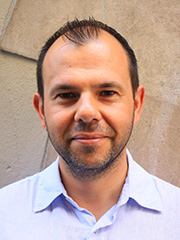Biological sciences
SRI platforms

Scientist
Sunnybrook Health Sciences Centre
2075 Bayview Ave., Room S216
Toronto, ON
M4N 3M5
Administrative Assistant: Michael Le
Phone: 416-480-6100 ext. 685482
Email: michael.le@sri.utoronto.ca
Education:
- B.Pharm Honours, 2002, University of Patras, Greece
- M.Sc., 2005, Laboratory Medicine & Pathobiology, University of Toronto, Canada
- PhD, 2010, Molecular Genetics, University of Toronto, Canada
Appointments and Affiliations:
- Scientist, Biological Sciences, Odette Cancer Research Program, Sunnybrook Research Institute
- Assistant Professor, Department of Medical Biophysics, University of Toronto
Research Foci:
- Cancer cell plasticity
- Metastasis
- miRNAs
- Neuroendocrine tumours
- Neuroendocrine transdifferentiation
Research Summary:
The Michael lab studies molecular pathways involved in cancer cell plasticity and metastasis. Cancer cell plasticity is broadly defined as the ability of cancer cells to transit from one differentiation state to another, and has been associated with the development of tumor heterogeneity, acquired resistance to targeted therapies, and metastasis - the leading cause of death of cancer patients. We have shown that during disease progression, pancreatic neuroendocrine tumors (PanNETs; originated from the islet cells of the pancreas) undergo dedifferentiation, leading to inactivation of mature ß cell gene sets and activation of progenitor cell-like gene sets. The dedifferentiation of PanNETs leads to the rise of a highly invasive and metastatic subtype.
Numerous studies have demonstrated the role of genetic alterations, such as mutation of tumor suppressor genes and amplification of oncogenes, during the initiation of tumorigenesis. However, recent studies underscore the critical role of non-genetic alterations, such as chromatin changes and microRNAs, and the microenvironment during cancer cell plasticity and metastasis. Our studies revealed that the miR-181-Meis2-Hmgb3 axis orchestrates PanNETs’ dedifferentiation, and the miR-23b cluster-ALK7 axis plays a key role during metastasis.
Currently, the Michael lab focuses on dissecting the role of microRNA-mediated signaling pathways during the dedifferentiation of PanNETs and the neuroendocrine transdifferentiation of many epithelial cancers, such as prostate cancer. A related research area in the Michael lab aims to delineate the dynamic changes within the tumor microenvironment during de-/trans-differentiation. Finally, the last research area seeks to examine the role of cancer cell plasticity during metastasis. Our overall goal is to assess if it is feasible to hinder or divert cancer cell plasticity and whether this could lead to new therapeutic approaches that could ultimately improve the survival and quality of life of patients with cancer.
The Michael lab employs diverse methodologies and models. We use various genetic approaches, such as gain and loss-of-function, and diverse omics approaches, including bulk and single-cell RNA-seq and ATAC-seq. To recapitulate the different steps of cancer progression, we use genetically engineered mouse models as well as orthotopic and experimental metastasis assays. Finally, our group is grateful to have access to samples collected from cancer patients currently undergoing various treatments at the Odette Cancer Centre at the Sunnybrook Health Sciences Centre, which enables us to perform translational studies.
Selected Publications:
See current publications list at PubMed
- Saghafinia S#, Homicsko K, Domenico AD, Wullschleger S, Perren A, Marinoni I, Ciriello G, Michael IP#*, Hanahan D*. Cancer Cells Retrace a Stepwise Differentiation Program during Malignant Progression. Cancer Discovery. 2021 Oct 1. #equal contribution, *co-corresponding authors
- Michael IP, Saghafinia S, Hanahan D. A set of microRNAs coordinately controls tumorigenesis, invasion, and metastasis. PNAS. 2019 Nov 26;116(48):24184-24195.
- Zeng Q, Michael IP, Zhang P, Saghafinia S, Knott G, Jiao W, McCabe BD, Galván JA, Robinson HPC, Zlobec I, Ciriello G, Hanahan D. Synaptic proximity enables NMDAR signalling to promote brain metastasis. Nature. 2019 Sep 18;573(7775):526-531.
- Michael IP, Saghafinia S, Tichet M, Zangger N, Marinoni I, Perren A, Hanahan D. ALK7 Signaling Manifests a Homeostatic Tissue Barrier That Is Abrogated during Tumorigenesis and Metastasis. Developmental Cell. 2019 May 6;49(3):409-424.e6.
- Allen E, Jabouille A, Rivera LB, Lodewijckx I, Missiaen R, Steri V, Feyen K, Tawney J, Hanahan D, Michael IP, Bergers G. Combined antiangiogenic and anti-PD-L1 therapy stimulates tumor immunity through HEV formation. Sci Transl Med 2017 Apr 12;9(385).


